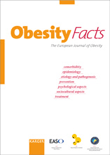
Obesity Facts
Scope & Guideline
Exploring innovative solutions for a healthier future.
Introduction
Aims and Scopes
- Clinical Guidelines and Best Practices:
The journal publishes clinical practice guidelines, systematic reviews, and meta-analyses aimed at standardizing care for obesity and related disorders. - Metabolic and Behavioral Research:
Research on the metabolic implications of obesity, including studies on body composition, metabolic syndrome, and the psychosocial aspects of obesity management. - Surgical and Non-Surgical Interventions:
Focus on evaluating various obesity treatments, including bariatric surgery and lifestyle interventions, assessing their effectiveness and patient outcomes. - Public Health Perspectives:
Work that explores public health initiatives, epidemiological studies, and societal factors influencing obesity prevalence and treatment efficacy. - Emerging Therapies and Innovations:
Investigation of novel pharmacological treatments, medical devices, and integrative health approaches for obesity management.
Trending and Emerging
- Metabolic Dysfunction-Associated Conditions:
An increasing emphasis on understanding metabolic dysfunctions associated with obesity, such as non-alcoholic fatty liver disease and insulin resistance, indicates a trend towards examining obesity from a metabolic health perspective. - Interdisciplinary Approaches:
Research that integrates various fields, including psychology, nutrition, and endocrinology, to understand and treat obesity is becoming more prominent, highlighting the need for comprehensive management strategies. - Impact of COVID-19 on Obesity:
Significant attention is being directed towards understanding how the COVID-19 pandemic has affected obesity prevalence, lifestyle behaviors, and treatment outcomes, a theme that reflects the current global health context. - Psychosocial Factors and Obesity:
There is a growing focus on the psychosocial aspects of obesity, including mental health implications, weight stigma, and social determinants of health, emphasizing the importance of a holistic view of obesity management. - Technological Innovations in Treatment:
The exploration of digital health interventions, wearable technology, and telehealth solutions for obesity management is on the rise, showcasing the journal's responsiveness to technological advancements in healthcare.
Declining or Waning
- Traditional Weight Loss Diets:
Research focusing solely on traditional weight loss diets is becoming less prevalent, as the focus shifts towards more integrated and personalized approaches to obesity management. - Solely Pharmacological Approaches:
There is a waning interest in studies that present pharmacological interventions in isolation without considering lifestyle changes or behavioral modifications. - Obesity Stigma and Public Perception:
Though still relevant, discussions around weight stigma and societal perceptions of obesity are appearing less frequently compared to more clinical and intervention-focused research. - Childhood Obesity Studies:
While still important, the volume of studies solely dedicated to childhood obesity is decreasing as the journal expands its focus to adult obesity and comorbidities. - Retrospective Cohort Studies:
The journal is favoring prospective studies and randomized controlled trials over retrospective cohort studies, possibly due to the latter's limitations in establishing causality.
Similar Journals

RBONE-Revista Brasileira de Obesidade Nutricao e Emagrecimento
Pioneering Research for a Healthier FutureRBONE-Revista Brasileira de Obesidade Nutrição e Emagrecimento is a leading open access journal dedicated to advancing the study of obesity, nutrition, and weight management, published by the Instituto Brasileiro de Pesquisa & Ensino Fisiologia Exercício - IBPEFEX. Since its inception in 2007, the journal has fostered a collaborative environment for researchers, healthcare professionals, and students to share groundbreaking findings and innovative methodologies. Located in São Paulo, Brazil, RBONE aims to address the increasing public health concerns associated with obesity and to promote effective strategies for healthy living. With its commitment to high-quality peer-reviewed content, the journal not only contributes to the scientific community but also serves as an invaluable resource for practitioners seeking evidence-based approaches in nutrition and exercise science. With an ISSN of 1981-9919, RBONE stands as a cornerstone for those pursuing excellence in research and application within this vital field.

Obesity Science & Practice
Empowering Innovations in Health and NutritionObesity Science & Practice is a prestigious, peer-reviewed journal dedicated to advancing knowledge and research in the fields of obesity, endocrinology, diabetes, metabolism, and nutrition. Published by Wiley, this journal has established itself as a vital resource for researchers, healthcare professionals, and students interested in the latest evidence-based practices and innovations in obesity management. With an impact factor that reflects its significance, and ranked in the Q2 category for both Endocrinology, Diabetes and Metabolism, and Nutrition and Dietetics in 2023, the journal aims to foster interdisciplinary collaboration and dissemination of cutting-edge research. Since its transition to Open Access in 2015, Obesity Science & Practice has become increasingly accessible, emphasizing the importance of making research findings available to a wider audience. This convergence of expertise and commitment to public health makes the journal an essential forum for advancing scholarship and practice in tackling widespread global health challenges.

Obesity Research & Clinical Practice
Connecting Science and Practice for Healthier LivesObesity Research & Clinical Practice is an esteemed journal published by ELSEVIER SCI LTD, focusing on cutting-edge research and clinical practices related to obesity and its multifaceted impact on health and wellness. With an ISSN of 1871-403X and an E-ISSN of 1878-0318, this journal serves as a vital resource for researchers and practitioners in the fields of Endocrinology, Diabetes and Metabolism and Nutrition and Dietetics. Notably, it holds a Q2 ranking in Endocrinology, Diabetes and Metabolism and a prestigious Q1 ranking in Nutrition and Dietetics for 2023, reflecting its influence and quality within the scientific community. The journal features a broad scope of research topics encompassing clinical findings, epidemiological studies, and therapeutic advancements in obesity treatment, aiming to improve health outcomes globally. Submissions are encouraged from diverse disciplines, ensuring a dynamic and multidisciplinary approach to tackling obesity-related challenges. Given its convergence of years from 2007 to 2024, Obesity Research & Clinical Practice stands as a prominent platform for disseminating valuable knowledge, insights, and groundbreaking research in this pressing area of public health.

REVIEWS IN ENDOCRINE & METABOLIC DISORDERS
Navigating the complexities of endocrine and metabolic health.REVIEWS IN ENDOCRINE & METABOLIC DISORDERS, published by Springer, is a leading journal in the field of endocrinology, diabetes, and metabolism, with an impressive Q1 ranking in both categories as of 2023. With an ISSN of 1389-9155 and E-ISSN 1573-2606, this journal serves as a vital resource for researchers, clinicians, and students seeking comprehensive reviews that address the latest advancements and interdisciplinary approaches in the management of endocrine and metabolic disorders. Operating from the Netherlands, it features articles that are rigorously peer-reviewed and is notable for its significant impact factor reflected in its Scopus rankings, placing it in the top percentile of its categories. Although it does not currently offer open access, it provides critical insights applicable to both basic and clinical settings, making it indispensable for those dedicated to enhancing patient outcomes in endocrine health.

Journal of Pediatrics Review
Fostering collaboration in the realm of pediatric healthcare.Welcome to the Journal of Pediatrics Review, an esteemed Open Access publication dedicated to advancing the field of pediatric medicine. Published by MAZANDARAN UNIVERSITY OF MEDICAL SCIENCES, this journal aims to disseminate high-quality, peer-reviewed research focused on the diverse aspects of pediatric healthcare, including perinatology and child health. With an ISSN of 2322-4398 and E-ISSN 2322-4401, the journal has positioned itself as a significant player in the field, notwithstanding its recent ranking of #327/330 in Scopus, reflecting its ongoing commitment to elevating research standards. Since its transition to Open Access in 2013, the Journal of Pediatrics Review has fostered global accessibility to groundbreaking studies, ensuring that healthcare professionals, researchers, and students alike can easily engage with contemporary pediatric issues. The journal’s dedicated efforts to enrich knowledge and foster collaboration make it an essential resource for anyone interested in the ongoing advancements in pediatric medicine.

Obesity
Bridging Science and Society in Obesity StudiesObesity is a premier academic journal published by WILEY, dedicated to advancing knowledge in the fields of endocrinology, nutrition, and metabolism. With an impressive impact factor and ranking in the top quartile across multiple categories, including Q1 in Endocrinology, Diabetes and Metabolism, and Nutrition and Dietetics, this journal serves as a critical resource for researchers, clinicians, and policymakers. The journal facilitates the dissemination of innovative research findings spanning the biological, behavioral, and societal factors associated with obesity, offering Open Access options to ensure broad visibility and accessibility to its content. With converged years from 2006 to 2024, Obesity provides an invaluable platform for cutting-edge studies that contribute to the global understanding of obesity and its multifaceted implications for health and wellness. Located in Hoboken, New Jersey, this esteemed journal plays a pivotal role in shaping the dialogue around obesity, making it an essential read for anyone invested in tackling this pressing public health challenge.

CURRENT OPINION IN PEDIATRICS
Shaping the future of child health through expert analysis.CURRENT OPINION IN PEDIATRICS, published by Lippincott Williams & Wilkins, is a highly esteemed journal in the realm of pediatrics, maintaining a remarkable Q1 status within the Pediatrics, Perinatology, and Child Health categories. With an impressive ranking of 42 out of 330 in the Scopus database, this journal positions itself at the forefront of pediatric research, embodying the voice of contemporary pediatric thought and innovation. Spanning an expansive publication history since 1989 and envisioned to continue through 2024, it serves as a critical platform for practitioners and researchers seeking the latest insights and opinions shaping child health practices. As a non-open access journal, it provides a curated collection of expert reviews, designed to facilitate informed decision-making among professionals while integrating emerging research findings into everyday pediatric care. With an emphasis on exceptional quality and contribution to the field, CURRENT OPINION IN PEDIATRICS is essential reading for anyone dedicated to enhancing child health outcomes.

Journal of Nutrition and Metabolism
Empowering Knowledge in Nutrition and MetabolismJournal of Nutrition and Metabolism, published by HINDAWI LTD, is a prominent peer-reviewed, open-access journal that has been serving the scientific community since 2010. Based in Egypt, this journal is dedicated to advancing the field of nutrition and metabolism, providing a platform for innovative research that spans endocrinology, diabetes, food science, and dietetics. With a consistent commitment to accessibility, it embraces open-access policies to facilitate wider dissemination of knowledge, ensuring that researchers, professionals, and students can freely engage with pivotal studies and findings. The journal is currently indexed with an impressive standing in various categories, including being positioned in Q2 in Food Science and Q3 in Endocrinology, Diabetes and Metabolism. Furthermore, it ranks among the top journals in its fields on Scopus, reflecting its significance and impact within the research community. With a focus on robust, evidence-based studies that inform dietary practices and metabolic health, the Journal of Nutrition and Metabolism plays a crucial role in addressing the challenges of modern nutrition.

Current Obesity Reports
Exploring innovative approaches to obesity challenges.Current Obesity Reports, an esteemed journal published by SPRINGER, serves as a pivotal platform for scholars and practitioners in the field of obesity research. With its ISSN of 2162-4968, this journal has been recognized within the competitive landscape of Medicine & Internal Medicine, achieving a commendable Scopus rank of #11 out of 167, placing it in the top 93rd percentile. Launched in 2012 and covering critical developments in obesity up to 2024, this journal synthesizes innovative research, evidence-based practices, and comprehensive reviews that cater to a diverse audience, from researchers to public health professionals. While currently not offering open access options, it remains dedicated to advancing knowledge and fostering discussions that address the multifaceted issues related to obesity, its public health implications, and treatment methodologies. For those involved in tackling obesity challenges, Current Obesity Reports stands as a vital resource, contributing significantly to the discourse and scholarship in the field.

Expert Review of Endocrinology & Metabolism
Unlocking the latest in endocrine research and clinical practice.Expert Review of Endocrinology & Metabolism is a premier journal dedicated to advancing the field of endocrinology and metabolism, published by Routledge Journals, Taylor & Francis Ltd, in the United Kingdom. With a robust focus on the latest research, innovative treatments, and clinical practices, this journal serves as an essential resource for healthcare professionals, researchers, and students seeking to stay abreast of developments in diabetes, obesity, thyroid disorders, and other endocrine-related conditions. Achieving a commendable Q2 status in Endocrinology, Diabetes, and Metabolism in the 2023 ranking, Expert Review of Endocrinology & Metabolism holds strong standing with an impressive Scopus rank, placing it at the 53rd percentile among its peers. The journal embraces a comprehensive approach, offering critical reviews, original research articles, and insights on emerging trends and technologies in the field. Although not an open-access journal, it provides extensive access options for subscribers and institutions, encouraging ease of dissemination and academic engagement. Through its commitment to high-quality content, Expert Review of Endocrinology & Metabolism remains pivotal for professionals aiming to enhance their understanding and practice in this vital area of medicine.